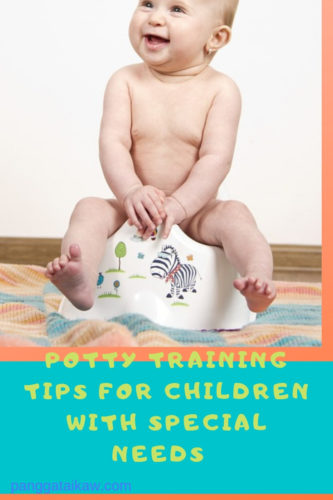Almost all schools require our special children to be potty trained for them to be accepted. Especially if the schools have no educational assistants and of course, the special education teachers can hardly accommodate your kids’ ” accidents,” if they happen. Thus, special needs parents face this big challenge of learning how to potty train their child with special needs before school starts.
For the parents of regular kids, potty training is not really difficult because kids usually show readiness as they age, which is usually from 18 months to three years old. Of course parents usually see resistance from the kids at first, but eventually they oblige happily.
It is different though for your special child who develops later compared to normal kids. Especially if they are non-verbal and communication will be a concern.
Is there a right age when to start potty training?
Because your child is special, you have to observe carefully if he shows signs of readiness. Of course, these signs show up later, and do not coincide with his chronological age.
Ask yourself these questions and when the answers are positive, then your special child is ready physically and psychologically to be started on potty training.
Therefore, the age when to start potty training varies from child to child. And will somehow depend on how they have developed physically and mentally at certain ages.
Physical Readiness
- Does he stay dry throughout the night?
- Is he dry at least for 1-2 hours at daytime?
- Can he sit with or without support?
- Can he keep his balance while squatting on the toilet bowl ?
- Is he able to walk without support?
Psychological Readiness
- Is your child able to understand instructions?
- Can your child show in his face that he needs to poop or pee at certain times?
- Can he control his urge when you tell him? Even partially?
- Can your child know the difference between wet and dry?
- Does he ask to be changed when soiled or wet either verbally if able or tries to get the clean diaper by himself?
- Is he able to undress and dress himself, even partially?
- Does he know when he needs to go to the bathroom? A non-verbal child may give out sounds that he is pushing.
- Is there no added stress in the home like birth of a sibling or loss of one or both parents?
We all know that special kids develop much more slowly than kids their age, so you really need to observe how he is developing and responding to your cues.
Never rely on his chronological age so you won’t be frustrated.
Bear in mind that they can be toilet-trained but much later than normal kids.
Reasons why special kids refuse toilet training
Even normal kids will refuse toilet training at some point at the start of the training. Or would sometimes regress after having been toilet-trained for a while.
More so for special kids, who might have a struggle with understanding the benefits. Or they might be having issues with the following:
- Fear of sitting on the toilet or falling down
- Sensory sensitivities
- Startling experience of an automatic flush in a public washroom
- Power struggles
- Stressful life events like birth of a sibling, death or separation of parents
- Poop withholding
Be very patient and understanding when your special one struggles with these issues.
It is really important that you give all the support that they need to overcome these challenges.
Once they feel comfortable and accepting of the training, it will be a breeze for both of you.
This post may contain affiliate links. Read the full affiliate disclosure here.
How to encourage your special child to continue with potty training
- Positive reinforcement- we see this in some potty training seats where the child is rewarded with happy tunes when they are successful. Or giving them something, like chocolates or just saying ” Good job! ” which will make them feel good or a happy dance or just clapping.
- Scheduling their poop or pee time- Making them seat on their potty or on the toilet bowl after every meal or before going to bed. Or making them pee every one to two hours. They will learn that doing it at certain times will make them do it successfully each time.
- Buying them the potty seat that they like or they enjoy.
- Reading them a book about potty training to give them ideas on how to properly do it.
- Letting them read a book or watch Nursery rhymes while they are seating on their potty. It will make them feel relaxed and focus on what they are reading or watching rather on how difficult they need to push.
- Happiness jar– Fill a jar with chocolates, lollipops, small toys, or notes about their favorite activity like a trip to the zoo or to buy their favorite book when they use the potty daily for a week.
- Celebrate in the evenings- when they stay dry during the day or they have used the potty successfully, celebrate by going to the park or do something that they enjoy before bedtime.
- Make them pee before bedtime even if they still wear diapers so there’s a greater chance of them staying dry the whole night. Or wake them up in the middle of the night to pee ( if it’s also comfortable for you or you’re still awake ) so he gets dry till morning.
What parents say about their experiences on potty training their special child
Diane on Nathan
 Diane has this to say about Nathan, who has Down syndrome and autism. He is now 13 years old and fully toilet trained.
Diane has this to say about Nathan, who has Down syndrome and autism. He is now 13 years old and fully toilet trained.
” We started Nathan on potty training when he was still a baby; we would let him sit in the toilet bowl after every meal.
His dad would let him pee before bedtime, at midnight, and wakes him up at 6:00 AM before he goes to work.
We used positive reinforcement by giving him M&Ms when he was successful. He was really happy about this.
When he started school at 5 years old, he was still on diapers. At 7, he began to get upset with his diapers, so we did not put him on it anymore. He had few accidents at school ( twice at home ) then, so we would let him bring under wears and socks in his school bag.
He can hold his bladder now for a long time, even during travels. His dad usually brings him to the bathroom every 2-3 hours to let him pee.
Nathan doesn’t want to poop in school, he usually does it at home at nighttime. So, when he’s taking a long time in the bathroom, that means he’s waiting for us to go in there and wash him.”
Emerald on Hailey
 Hailey who has Down syndrome and now 3 years and 9 months is just starting on potty training. She sits on her potty but still refuses to pee or poop there.
Hailey who has Down syndrome and now 3 years and 9 months is just starting on potty training. She sits on her potty but still refuses to pee or poop there.
As of now, Emerald observes that Hailey can follow simple instructions like if she wants her milk, she will say “dede,” and her mom would ask her to get the bottle and she will follow.
She still wears diapers all day, but tells her mom if she’s done peeing or pooping. Her mom will try to use the rewards system to encourage Hailey to learn.
Lee on Mark

Lee, his mom, started potty training him when he was around 5 years old .
They would let him sit in the toilet bowl after breakfast and dinner to poop.
At least every hour, they would let him pee in the toilet as well.
Mark was dry at night at around 7 years old and did not want to wear diapers anymore.
He goes to school without diapers now, but still would have accidents. At home, he would just pee anywhere. Likewise, he never goes to the bathroom on his own.
[amazon fields=”038538369X” value=”thumb”]
[amazon fields=”0763644765″ value=”thumb”]Check out these books on potty training. Click the images to see the price.
Patience and determination brings success
It takes lots of patience, understanding and motivation to stay focused and determined to make toilet training successful.
Just remember that like your special child’s development, toilet training likewise takes awhile to be a success.
Count every day and his small wins and reward him and yourself for these little accomplishments.
He will eventually refuse to wear his diapers and will be happy to sit on his potty or the toilet bowl to do his thing.
And you will both dance with joy once he does it on his own, every day, every time.
Related post: Nine best potty training toilet seats….choose what your special child will love to use
Have you started to potty train your special child? Do you have any tips that you could share other special needs parents?





I enjoy reading your articles. Your passion for helping people with special needs is very inspiring. And not a lot of people would do this.
Your write-ups are sort of an awakening to people who doesn’t struggle having special kids. It makes them more understanding, patient and kind. Hoping to see more readings of this kind in the future.
More power!
Thanks Odette for the support and words of encouragement.
Glad that you enjoyed reading my posts.
Marita
Very informative. This could be very useful for me and for the parents of my sped pupils. This could help them train their kids at home.
Hi Bing,
Glad that you found this post helpful and especially for the parents of course.
God bless,
Marita
I love this article.
It is a great thing to train kids on how to do things. A normal kid at times find it very difficult to comply easily with potty training.
I have a friend like that when I was in junior secondary school. The girl was sharp and smart but the only thing that was there is that, she pees whenever she sleeps. If she mistakenly sleeps in the class during the day , the outcome is usually frustrating. That’s why she hardly sleeps in the afternoon. When she slees at night, oh my God, before the next morning her bed is already filled with pee . She was not happy about the issue anyway. I have an Uncle like that who has the same issue. Who are to be blame? I don’t know.
The issue with a special kid is more frustrating. But I must commend those parents that were able to train their special kid on so many things. Although, might not seem easier but the outcome can eventually bring them prestige.
Your friend and uncle, who I assume are adults already could have medical problems that need to be addressed, so maybe advise them to consult a doctor.
Parents of special children are usually patient and so understanding of their kids that they are able to accomplish lots of things for them and one of them is potty training.
Thanks for reading.
Marita
What a helpful and informative article for parents! I have been searching the internet recently on this topic, and your post had really been a great help. I have been looking to show my sister whose son, who is my nephew, is autistic and non-verbal, so she has been thinking on how to handle potty trainin
During the process and with this article I can say it takes a lot of patience, understanding and motivation to stay focused and determined to make toilet training successful, like that of my nephew which takes a while and I know your article will benefit him and his mother.
Glad that you are planning to let your sister read this post to help her go through potty training her son who is autistic and non-verbal.
I hope that it will really be beneficial to her.
Thanks!
Marita
Dear Marita,
Thanks a lot for the helpful and informative article and I got great insights from your article.
You not only addressed the problem, challenges of special child but you have also provided with solution as well. Physical and psychological readiness you shared is very helpful.
Parents potty training experiences is very inspiring. Through this post you are doing a great service and hats off to you. Being a Sunday class teacher this post means a lot to me, there are few special children in our church as well and now I have some idea how to build a better relationship with them. And I’m going to share this post with their parents as well.
Much Success!
Paul
Hi Paul,
I honor you for giving your time to be a Sunday school teacher and even having special children in class.
Readiness for the special kids is the very first step for potty training to be successful. The parents need to be aware of this to avoid frustration.
Thanks for visiting.
Marita
Thanks for writing this article on how to potty train a child with special needs.i must commend you for taking your time to write this amazing things to do on how to potty train a child.i know many will find it useful because I do find it useful and full of information on how to potty train my child before enrolling him in to school
Happy that you find this article helpful. Thanks for visiting.
Marita
You did a great job of introducing all the different factors involved in having a child ready for potty training.
Likewise, you explained that physiological aspects, like if he is able to dress or undress has a lot to do with his readiness for potty training.
There are also some very specific problems that some of the children have, like fear of falling down in the toilet which has to get handled.
The best part of this article that I liked was where you were talking about encouraging a child for potty training and be patient to get him to do it.
Thank you for the nice comments, Bijan.
Marita
This is quite educative Dr. Marita. Every child, normal or special deserves to be celebrated. Millions all over the world are looking for this great gift from God. Like you rightly said, every special is different. Parents have to keep encourage their special kids to use the pooty even when they initially opposed the use. The methods and techniques you listed in your post would definitely add up. Patience and encouragement are the keywords here when training a special child to use the pooty.
Yes, it is really important that parents need to be very patient and understanding to their special kids so potty training will be a smooth process with only a few bumps in between. Thanks for reading. Marita
This is a great and simple to follow guide on how to pottytrain a child.
You laid it all out clearly and showed series of examples that helped emphasize your various points. This guide will be very useful for me because my wife is a nursing mother.
This is an eye opener for me and I love the fact that you shared other people’s experience with your blog readers. I hope to also share my lovely experience anytime soonThanks for sharing
Good luck to both you and your wife when your baby is ready for potty training. How old is your baby now? Marita
This write-up is absolutely what I was looking for to show a cousin of mine. Her daughter is autistic and so far non-verbal, so she has been thinking about how to handle potty training. About what age would you recommend someone in her position attempt to potty train? Her daughter (who is absolutely precious) is four years old as of last month.
Thank you again! I’m eager to read your thoughts.
Cheers!
There is no specific age to start. It all depends when the special child is ready physically and psychologically. The age varies from child to child. It could be started at 18 months, 24 months, 3 years old or even later. The mother needs to observe her child to see signs of readiness. Thanks for reading. Marita